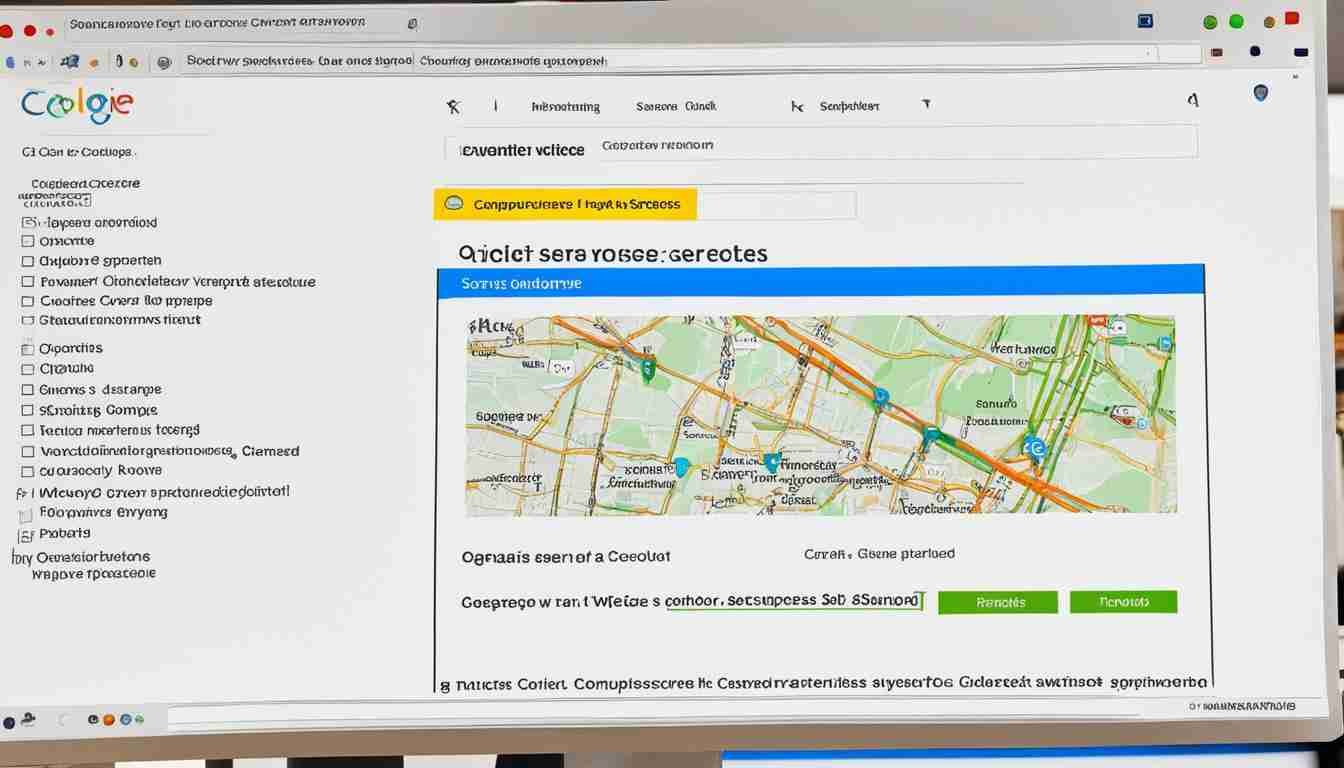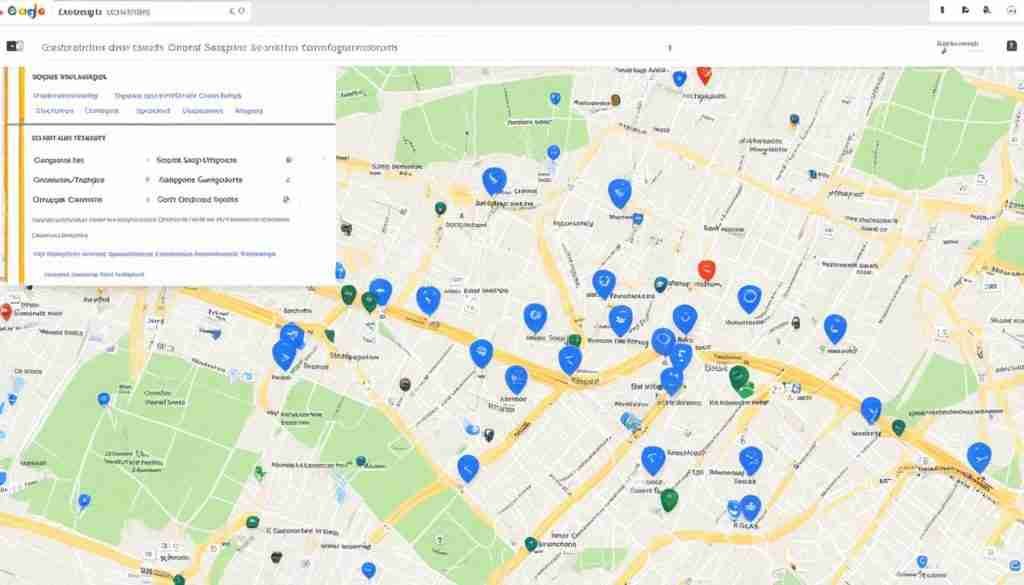
Did you know that ads show up on over 51% of Google’s first-page search results? This fact shows how vital it is to know about Search Engine Results Pages (SERPs) and their role in SEO. SERPs are what search engines like Google show when you ask them a question. They mix organic search results, paid ads, and special features like Featured Snippets and Knowledge Graphs.
Understanding SERPs is key for SEO. It helps you make your website more visible and get more visitors. The higher your site ranks on SERPs, the more clicks it gets and the more people see it.
Key Takeaways
- SERPs are the pages search engines show when you search for something.
- They can have organic results, ads, and special features like Featured Snippets and Knowledge Graphs.
- Knowing about SERPs and their parts is important for SEO and making your website more visible.
- Being higher on the SERP means more people are likely to click on your site and visit.
- Optimizing your site for SERPs can boost your online presence and help you reach your audience better.
Explaining Search Engine Results Pages (SERPs)
When you search on a site like Google, the page showing results is called a Search Engine Results Page (SERP). SERPs are key in search engine optimization (SEO). They help your website get seen by potential customers.
What Is SERP?
A SERP shows what a search engine like Google, Bing, or Yahoo finds for a search query. It has different parts, including:
- Organic search results: These are the free listings that match the search engine’s rules and the content’s relevance to the query.
- Paid search results: Known as pay-per-click (PPC) ads, these are ads businesses buy to show up high on the SERP.
- Featured snippets: These are quick answers to a query shown at the top of the SERP, taken from a relevant webpage.
- Knowledge graphs: These are info boxes with fast facts about a topic or entity.
- Local search results: These are listings for nearby businesses that match the user’s location and query.
- Rich snippets: These are search results with more info, like product ratings, images, or video thumbnails.
The look of a SERP changes based on the search query, the user’s location, and other things search engines look at. They aim to show the most relevant and useful info.

Knowing what’s on a SERP helps with SEO optimization. It lets businesses and content creators make their online presence better. This way, they can show up more in searches and draw in more potential customers through organic and paid search.
The Importance of SERPs in SEO
Search Engine Results Pages (SERPs) are key in Search Engine Optimization (SEO). They show how your site looks and performs in search results. This affects your site’s visibility, organic traffic, and success.
High rankings on SERPs mean more clicks and organic traffic. Studies show the #1 result on Google gets over 30% of clicks. The top 3 results get nearly 75% of all clicks.
Elements on the SERP also affect user behavior and engagement. Features like featured snippets, image thumbnails, and local packs can boost your site’s visibility and bring in more qualified traffic.
Optimizing your site for SERPs is key to SEO. This includes strategies like:
- Improving on-page SEO with better content, site speed, and mobile-friendliness
- Boosting off-page SEO with link building and other techniques
- Keeping up with ranking factors and algorithm changes
- Adjusting your SEO strategy to match the changing SERP landscape
By focusing on SERP optimization, you can improve your site’s visibility. This leads to more high-quality organic traffic and greater online success.

“Appearing on the first page of search engine results can increase site traffic significantly.”
Conclusion
Search Engine Results Pages (SERPs) are key to your SEO strategy. They show organic search results, paid ads, and special features like Featured Snippets. By understanding these, you can make your website and content better. This helps you rank higher and get more targeted traffic.
Improving your SEO means focusing on what users want and making your pages relevant and valuable. This approach helps you reach potential customers more effectively.
As SEO changes, it’s important to keep up with new trends and updates. By watching your SERP performance and using data to guide you, you can boost your website’s visibility. This leads to more organic traffic and helps you meet your business goals.
At Ma Consulting Services, we’re all about helping our clients lead in SERPs and maximize their online presence. Our team of SEO experts offers the strategies and tools you need to succeed in the fast-paced SEO world. Whether you’re a small business or a big company, we’re here to help you thrive online.
FAQ
What is a SERP?
What are the different elements that can appear on a SERP?
Why are SERPs important for SEO?
Source Links
- What Are SERPs & Why Are They Important for SEO? – https://backlinko.com/hub/seo/serps
- SERPs: Search Engine Results Pages Explained – https://www.semrush.com/blog/serp/
- SERP | Everything You Need to Know About Search Engine Results Pages | Mailchimp – https://mailchimp.com/marketing-glossary/serp/
- What Is a SERP? How Search Engine Results Pages Work – https://www.wordstream.com/serp
- Beginner’s Guide to Search Engine Results Pages (SERPS) – https://ardentgrowth.com/blog/serps
- What is a SERP? A Guide to Search Engine Results Pages | Definition from TechTarget.com – https://www.techtarget.com/whatis/definition/search-engine-results-page-SERP
- What Are SERPs? Why SERPs Matter For SEO – SEO Glossary – https://growhackscale.com/glossary/serp
- 5 Reasons Why SERPs Are Important to SEO | The Enterprise World – https://theenterpriseworld.com/5-reasons-why-serps-are-important-to-seo/
- Breaking Down SERPs to Increase SEO Results – https://www.brightedge.com/blog/serp-serps-must-knows
- What Are SERPs and Why Are They Critical for SEO? | SEO.co – https://seo.co/serp/
- What Is SERP in Digital Marketing | seobase – https://seobase.com/what-is-serp-in-digital-marketing-2
- What Are SERPs (And Why Are they Important to SEO)? – https://aioseo.com/what-are-serps/




